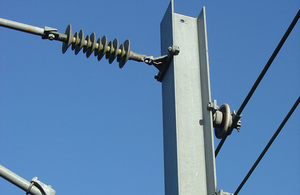£200,000 boost for better mobile connections on rail network
New funding for antenna prototype will help avoid internet blackouts on train journeys.

- Transport Secretary announces £200,000 towards research into developing an innovative antenna prototype for rail gantries, helping to make internet blackouts on the commute a thing of the past
- government-backed research has found that updating existing infrastructure is an affordable solution to improving mobile connectivity for passengers
- telecomms service providers urged to work with Network Rail to come up with innovative designs for trial phase of project
The Transport Secretary Grant Shapps has today (24 July 2020) announced that a £200,000 government investment will launch research into developing an innovative prototype that will improve mobile connectivity for thousands of rail passengers. It could signal the end of internet blackouts leading to more productive rail journeys thanks to better wifi.
With over a third of the 11,000 miles of Great Britain’s railways electrified using overhead line equipment (OLE), research funded by the Department for Transport has found that it is possible to attach communications antennas to them, improving connectivity for passengers as well as reducing the need to build additional track-side masts, therefore cutting costs.
Published today, the Mott MacDonald report has found there is significant potential to utilise these existing structures to mount equipment, a technique that is increasingly being used in countries such as Austria to address railway mobile connectivity challenges.
Telecom operators are now being urged to come forward and develop suitable equipment for the next phase of the trial which will test how antennas can be safely fixed onto OLE in a live railway environment with findings expected to be published by March 2021.
Transport Secretary Grant Shapps said:
It is just not good enough that passenger’s mobile connectivity experience is still poor, blighting our efforts to work, shop and communicate on everyday journeys.
By harnessing innovation and updating existing infrastructure, we can build the railway of tomorrow and find affordable solutions to improve travel for passengers. I urge telecom operators to match our ambition and we can commit to working closely together to design equipment and move forward in the next stage of this exciting trial.
Charlene Wallace, Network Rail’s director of passenger and customer experience, said:
We are keen to work with government and train and telecom operators to deliver more consistent and reliable mobile coverage that improves passengers’ journeys in an efficient and affordable way.
Today’s report highlights how the railway can share its electrical infrastructure assets to deliver a better service, and we are delighted that funding has been made available to test solutions at our Rail Innovation and Development Centres.
This project, together with other steps we have taken – increased seating at stations, improved facilities such as free toilets and new water fountains, and greater accessibility – will help to improve passengers’ journeys on the rail network, particularly as we welcome more people back to the railway in the wake of the COVID-19 pandemic.
Today’s news comes as Ofcom is set to publish on Monday (27 July 2020) updated advice on suitable bands for trackside wifi connectivity, supporting government efforts to improve connectivity on the railway.
It also coincides with further research commissioned by the department, published today by Transport Focus, which shows that rail passenger’s mobile connectivity experience is still poor. The Transport User Panel Survey found the level of satisfaction with connectivity on trains is generally low while the expectation of being connected is high.
Anthony Smith, chief executive of the independent watchdog Transport Focus, said:
From helping plan journeys to working on the go, passengers value being able to access the internet on the move so they can do something useful during travel time. However, wifi speed and connectivity can be patchy.
We know from our research that passengers now expect a reliable connection and access to free wifi on trains, but only 3 in 10 are satisfied with the connection they experience so they will welcome news of this trial.
The department is now working with Network Rail’s Rail Innovation and Development Centres to identify a suitable OLE to conduct the trial by March 2021 and welcomes the opportunity to work collaboratively with telecom providers and participate in testing different prototype antennas.
Rail media enquiries
Media enquiries 0300 7777878
Switchboard 0300 330 3000